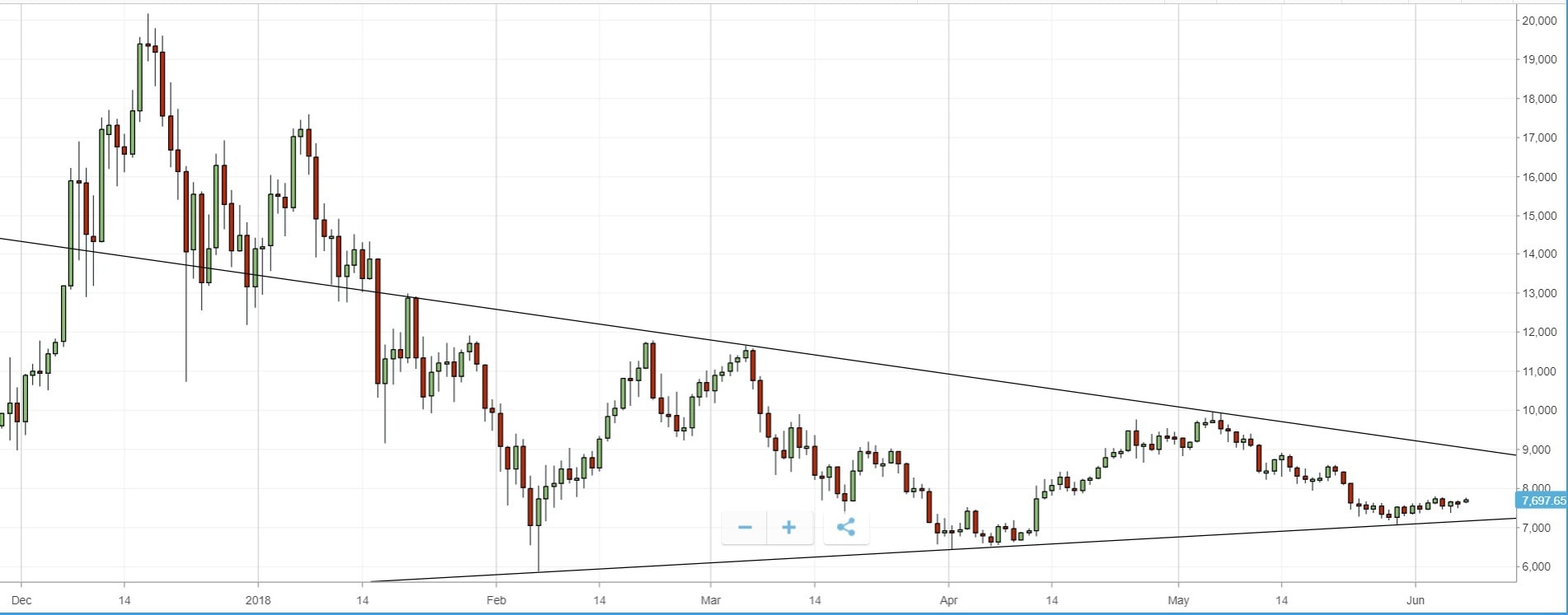Tech stocks making new all-time highs
Despite fears of trade wars and tariffs, a rally for the technology sector took the Nasdaq Composite and Russell 2000 to new all-time highs. This was partly due to better-than-expected economic data out of the US, implying that GDP for Q2 will be on a stronger footing, but more importantly, the index was helped by stocks like Tesla, Twitter, and Netflix. Tesla jumped nearly 10% on 6th June after CEO Musk reassured shareholders that building 5,000 of its Model 3 cars per week by the end of June was “quite likely”, while Twitter rallied by 16% this month, on news that the social media site will replace Monsanto on the S&P 500, thus, forcing passive funds to buy it on a far larger scale. The S&P 500 itself was up 2.5% this month with the German DAX lagging behind at 1.75% given ongoing uncertainty in Italy. In Asia, stock markets were also positive with the Chinese Shanghai 50 and Japanese Nikkei 225 up 1.7% and 2% respectively.
Copper up 7% in a week given worries of supply disruptions
The price of copper rose above $7,000 a tonne amidst fears that the giant Chilean mine Escondida could be hit by further industrial unrest. The union has made some significant demands to which shareholder BHP has 10 days to respond. Most of the best metal has been extracted from the mine, forcing BHP to mine low-grade ore from two pits that are between 500 and 620 metres deep; making it more likely that they will reject the demands, thereby, causing supply constraints to be dragged on longer. In 2017, global copper supply was disrupted by labour issues and government restrictions on exports; it seems likely that 2018 could follow suit!
Oil down 3% over the week with expectations for further declines
In line with our expectations of a politically motivated intervention on the price of oil, the U.S. government has unofficially asked Saudi Arabia and some other OPEC producers to boost output, sources told Reuters. With US midterm elections in November, price per gallon is a crucial barometer of Trump’s electoral support and, hence, the forthcoming OPEC meeting in Vienna on the 22nd June will be critical. We would expect the price of oil to continue to decline.
Mexican peso hit on escalation of trade war
The Mexican peso was the worst hit currency this week, reaching 20.65 pesos per dollar after the government announced that it will impose its own import duties on a wide range of US products, including bourbon, apples, potatoes, cheese and pork in retaliation for the Trump administration’s levies on steel and aluminium. This not only instigates trade wars between the two neighbours, but does so at a sensitive time when left-wing populist Lopez Obrador is expected to win the presidential elections on 1st July. Alongside Mexico, the European Commission also announced plans to apply tariffs to a range of US goods worth $2.8bn in value. The measures are aimed to be in place by July. The G7 meeting over the weekend is expected to set the scene for further trade discussions.
Positive week for Cryptos
Cryptocurrencies had a second consecutive positive week following a month of weakness. XRP was up nearly 13% in the week followed by Ethereum at 9% and Bitcoin at 3.75%. More specifically, Bitcoin rebounded from this year’s support line from the lows in February and April, suggesting a retest to the upside of the technical formation. June will be a critical month to assess market sentiment as a break, either way, could be significant.

Source: eToro
Key Week for Central Banks
Heavy calendar this week with the three most important central bank meetings coinciding. The Federal Reserve is expected to raise rates by 25bps to 2%, in line with the analysis presented in the FOMC minutes of last month. The Central Bank of Argentina may choose to be prudent and maintain rates at 40% for a further fortnight as discussions progress with the IMF, World Bank, IADB and PBoC. The Bank of Japan is likely to remain dovish as services and household spending were weaker than expected and a weaker yen helps the corporate sector. The two central banks with a potential to surprise on the more hawkish side are the ECB and the Bank of Russia. The ECB could be announcing the end of its bond-buying program this year, whilst Bank of Russia governor Nabiullina in an interview with Reuters mentioned that the easing policy, which has brought rates from 17% in December 2014 to 7.25% in April, could be coming to an end.
Key Economic Releases & Central Bank decisions (UK time)
Monday June 11 2018 Previous
4:00 PM US Consumer Inflation Expectations MAY 2.98%
Tuesday June 12 2018 Previous
1:30 PM US Core Inflation Rate YoY MAY 2.1%
9:00 PM AR Interest Rate Decision 40%
Wednesday June 13 2018 Previous
9:30 AM GB Core Inflation Rate YoY MAY 2.1%
7:00 PM US Fed Interest Rate Decision 1.75%
Thursday June 14 2018 Previous
3:00 AM CN Retail Sales YoY MAY 9.4%
1:30 PM EA ECB Press Conference +0%
Friday June 15 2018 Previous
4:00 AM JP BoJ Interest Rate Decision -0.1%
11:30 AM RU Interest Rate Decision 7.25%
This content is intended for educational purposes only, and should not be considered as investment advice. Past performance is not an indication of future results. Your capital is at risk.

